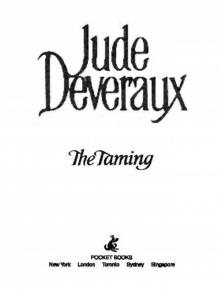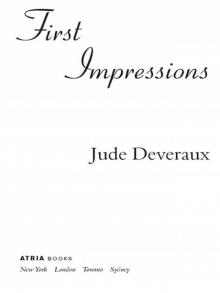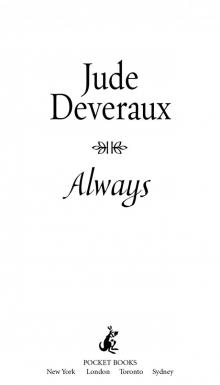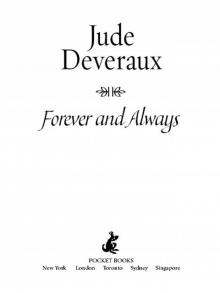- Home
- Jude Deveraux
Twin of Fire
Twin of Fire Read online
Books by Jude Deveraux
The Velvet Promise
Highland Velvet
Velvet Song
Velvet Angel
Sweetbriar
Counterfeit Lady
Lost Lady
Riverlady
Twin of Fire
Twin of Ice
The Temptress
The Raider
The Princess
The Awakening
The Maiden
The Taming
The Conquest
A Knight in Shining Armor
Wishes
Mountain Laurel
The Duchess
Eternity
Sweet Liar
The Invitation
Remembrance
The Heiress
Legend
An Angel for Emily
The Blessing
High Tide
Temptation
The Summerhouse
Forever…A Novel of Good and Evil, Love and Hope
Published by POCKET BOOKS
This book is a work of historical fiction. Names, characters, places and incidents relating to non-historical figures are either the product of the author’s imagination or are used fictitiously. Any resemblance of such non-historical incidents, places or figures to actual events or locales or persons, living or dead, is entirely coincidental.
An Original Publication of POCKET BOOKS
POCKET BOOKS, a division of Simon & Schuster, Inc.
1230 Avenue of the Americas, New York, NY 10020
Copyright © 1985 by Deveraux Inc.
All rights reserved, including the right to reproduce this book or portions thereof in any form whatsoever. For information address Pocket Books, 1230 Avenue of the Americas, New York, NY 10020
ISBN-13: 978-0-7434-5935-8
ISBN-10: 0-7434-5935-0
POCKET and colophon are registered trademarks of Simon & Schuster, Inc.
Visit us on the World Wide Web:
http://www.SimonSays.com
Thank You
I’d like to thank the two editors I had on these books, Kate Duffy and Linda Marrow. They read rewrite after rewrite, some of them in my microscopic handwriting, and they listened to me for hours on end. My characters didn’t sneeze that they didn’t discuss it with me and they never once lost patience.
Thank you to all the Colorado librarians. Heaven is peopled with Colorado librarians.
I’d like to thank Dr. Tom Dilday and Dr. Curtis Boyd for talking to me about repairing broken bodies. And Annette Swanberg for going out of her way to take me to the Huntington house for one more look.
And I’d like to thank Glenna Boyd for taking me for walks in beautiful places, then listening to me for hours blabbing about dynamite and four-horse-team versus six-horse-team wagons and The Sisterhood. I will try to look at the scenery in the future.
I’d also like to thank Ron Busch, who believed that I could make it and brought me into the family of the best publishing house in the world.
Author’s Note
Until I started researching my novels, I had the idea that, until after WWI, men and women were content with their roles in life. I thought women sweetly submitted to their husbands and husbands were happy with their docile women.
But when I delved into the medieval period, I was shocked to find out that, even in the fourteenth century, women were writing very modern sounding books on the oppression of women by men. And as for the men, there’s a joke that made the rounds long before Shakespeare used it that said a prize would be given to any man who could command his wife to follow him and she would obey with no questions asked or excuses as to why she couldn’t go. As the story goes, the prize is still waiting to be handed out.
If I was shocked in my medieval research, there’s no word to describe what I discovered while looking into the nineteenth century. I have read a great deal of twentieth century feminist writings, but nothing today is more militant than that written by nineteenth century women. They were fighting exactly the same battles: for equal pay, against rape and wife beating, to make laws so men could not kidnap their children from their ex-wives, and for hundreds of other reforms. The big difference seemed to be that for every book a woman wrote about sexual equality, a man wrote a book stating that if women didn’t get back into the kitchen, they were going to destroy the world. Now, a hundred years later, it looks as though women are still fighting, while men have almost given up. Too bad, because, as I think it’s obvious from my writing, I just love a good rousing argument.
Twin of Fire
Prologue
Philadelphia, Pennsylvania
April 1892
“Surprise!” eleven people shouted as Blair Chandler entered the dining room of her Uncle Henry’s house. She was a pretty young woman, with dark brown hair highlighted with red glints, wide-set blue-green eyes, a straight, aristocratic nose and a small, perfectly shaped mouth.
Blair paused for a moment, blinking back tears of happiness, as she looked at the people in front of her. There were her aunt and uncle, Alan beside them, watching her with love in his eyes, and surrounding him were her fellow medical students—one woman and seven men. As they beamed at her with pleasure, standing behind the table heaped with gifts, she couldn’t seem to remember the past few years of struggle to graduate and earn her medical degree.
Aunt Flo, with the grace of a young girl, hurried forward. “Don’t just stand there, dear. Everyone is dying to see your gifts.”
“This one first,” Uncle Henry said, holding out a large package.
Blair thought she knew what was in the box, but she was afraid to hope. When she tore away the wrapping and saw the leather case with the clean, new medical instruments, she sat down heavily in the chair behind her, unable to speak. All she could do was run a finger over the brass plate on the bag. It read: Dr. B. Chandler, M.D.
Alan broke the awkward silence. “Is this the woman who put the rotten eggs in the surgeon instructor’s wardrobe? Is this the woman who stood up to the entire Philadelphia Board of Hospitals?” Bending, he put his lips close to her ear. “Is this the woman who placed first in the exams at St. Joseph’s and became the first woman to intern on their staff?”
It was a moment before Blair could react. “Me?” she whispered, looking up at him, her mouth open in disbelief.
“You won your internship,” Aunt Flo said, her face beaming. “You’re to start in July, just as soon as you return from your sister’s wedding.”
Blair was looking from one person to the other. She had tried her best for St. Joseph’s, had even hired a tutor to help her prepare for the tests, but she’d been told that this city hospital, as opposed to a women’s clinic, did not accept female physicians.
She turned to her Uncle Henry. “You’ve had a hand in this, haven’t you?”
Henry swelled his big barrel chest with pride. “I merely made a wager that if my niece didn’t score higher than anyone ever had on their test, they didn’t have to give her a position. In fact, I told them you’d even consider giving up medicine and staying home to take care of Alan. I don’t think they could resist the chance to see a lady doctor brought to her senses.”
For a moment, Blair felt a little weak. She’d had no idea that so much had been riding on that treacherous three-day test.
“You made it,” Alan laughed. “Although I’m not sure I like being the consolation prize.” He put his hand on her shoulder. “Congratulations, sweetheart. I know how much you wanted this.”
Aunt Flo handed her a letter that gave confirmation that she had indeed been accepted at St. Joseph’s Hospital for internship. Blair clutched the paper to her breast and looked at the people around her. Right now, she thought, my entire life is stretching before
me—and it is perfect. I have family, friends; I am going to be allowed to train at one of the finest hospitals in the U.S.; and I have Alan, the man I love.
She rubbed her cheek against Alan’s hand as she looked at the shiny medical instruments. She was going to realize her lifelong dream of becoming a doctor and marry this kind, loving man.
All that remained was for her to return to Chandler, Colorado, and attend the marriage of her twin sister. Blair was looking forward to seeing her again after all these years, and to the two of them sharing their happiness about the men they’d chosen, about the lives they’d chosen for themselves.
And while she was in Chandler, Alan was going to visit and meet her mother and sister. They would formally announce their engagement then, the wedding to be held after both she and Alan finished their internships.
Blair smiled up at her friends, wanting to share her happiness with everyone. Just another month, and all that she’d worked for would begin.
Chapter 1
Chandler, Colorado
May 1892
Blair Chandler was standing quietly in the ornate front parlor of the Chandler house, amid heavy, dark, carved furniture dressed with little lace doilies. It didn’t matter that her mother had remarried many years ago and her new husband, Duncan Gates, had ended up paying for the house, the townspeople still thought of it as having belonged to William Houston Chandler—the man who’d designed it, had it built, and died before he could make the first payment.
Blair kept her eyes downcast, covering their blue-green light that was flashing now in anger. She’d been in her stepfather’s house for a week, and all the coarse-looking little man did was yell at her.
To all the world, she looked to be a respectful young woman, standing there in her proper white blouse and dark cord skirt, most of the voluptuousness of her hourglass figure concealed in folds of cloth. And her face held such a quiet, gentle prettiness that no one would have guessed the spirit beneath. But anyone who was around Blair for long knew that she could hold her own in an argument.
Which was why Duncan Gates didn’t lose a minute in telling her how to become a “proper” lady. And his idea of what a lady was did not include a young woman who had been trained to be a doctor and was especially good at gunshot wounds. He couldn’t appreciate the fact that Blair’s sewing ability worked just as well on a perforated intestine as it did on a sampler.
He ranted and raved, as he’d done for a week, and Blair took it until she could stand no more, then she began to give him back some of his own. Unfortunately, that was usually when Blair’s mother or sister stepped in and prevented further words from being spoken. It hadn’t taken Blair long to learn that Mr. Gates ruled his household, and the women in it, with an iron fist. He was allowed to say what he pleased, but no woman was allowed to thwart him in any way.
“I’m hoping that you will come to your senses and give up this medicine nonsense,” Gates was shouting at her now. “A lady belongs in the home and, as Dr. Clark has proven, when a woman uses her brain, her female functions suffer.”
Blair gave a great sigh, barely glancing at the worn pamphlet that Mr. Gates held aloft. Dr. Clark’s booklet had sold hundreds of thousands of copies and had done an enormous amount of damage to the furthering of education for women. “Dr. Clark did not prove anything,” she said tiredly. “He said he’d examined a flat-chested fourteen-year-old female student and, from that one examination, he concluded that if women used their brains, their reproductive systems would suffer. I don’t consider that conclusive evidence at all.”
Mr. Gates’s face began to turn red. “I’ll not have language like that in my house. You may think that because you call yourself a doctor you have a right to indecent behavior, but not in my house.”
The man was beginning to pass what Blair could tolerate. “Since when is this your house? My father—.”
At that moment, Blair’s sister, Houston, stepped into the room and put herself between them, giving Blair a look of anguish. “Isn’t it time for dinner? Perhaps we should go in,” Houston said in that cool, reserved voice of hers—a voice that Blair was beginning to hate.
Blair took her place at the big mahogany table and all through dinner answered Mr. Gates’s nasty-tempered questions, but her mind was on her sister.
Blair had looked forward to returning to Chandler, to seeing her sister and mother, to again seeing her childhood playmates. It had been five years since she’d been back and, the last time, she’d been seventeen, preparing to enter medical school and bursting with enthusiasm about her new studies. Perhaps she’d been too wrapped up in her own thoughts to really see the atmosphere in which her mother and sister were living.
But, this time, she’d felt the oppression as soon as she got off the train. Houston had met her, and Blair was sure that she’d never in her life seen a more perfect specimen of a rigid, frigid, unbending woman. She looked like a perfectly formed woman who just happened to be made out of ice.
There were no exuberant huggings at the train station, nor were there exchanges of gossip as they were driven back to the Chandler house. Blair tried to talk to her sister, but she only received that cool, remote stare. Even the name of Leander, Houston’s fiancé, brought no warmth to Houston’s demeanor.
Half of the short trip was made in silence, Blair clutching her new surgical bag, afraid to let it out of her hands, while they drove through Chandler.
The town had changed a great deal in the five years since Blair had seen it. There was a feeling of newness about the place, that things were building and growing. The western town was so different from cities and towns in the East, where traditions were already established.
The buildings, with their false fronts, a style someone had called Western Victorian, were either new or under construction. Chandler had been merely a pretty piece of land with a magnificent amount of surface coal when William Chandler had arrived. There’d been no railroad, no town center, no name for the few stores that were serving the scattered ranchers in the area. Bill Chandler soon remedied that.
When they pulled into the drive of the Chandler house—or mansion, as the townspeople liked to call it—Blair smiled up at the ornate three-story building with pleasure. Her mother’s garden was green and lush and she could smell the roses. There were steps from the street up to the house now because the hill in the street had been levelled for the new horse-drawn trolley cars, but it hadn’t changed much otherwise. She walked across the deep porch that wrapped around the house and went through one of the two front doors.
It didn’t take Blair ten minutes inside the Chandler house to see what had taken all the spirit out of Houston.
Standing inside the doorway was a man with a solidness that any self-respecting boulder would envy—and the look on his face matched the shape of him.
Blair had been twelve years old when she’d left Chandler to go to Pennsylvania to live with her aunt and uncle so she could study medicine. And in the intervening years, she’d forgotten just what her stepfather was like. Even as Blair smiled at him and offered him her hand, he started telling her what a bad woman she was and that she wouldn’t be allowed to practice her witchcraft doctoring under his roof.
Bewildered, Blair had looked at her mother in disbelief. Opal Gates was thinner, her movements slower than Blair remembered, and before Blair could reply to Mr. Gates’s remarks, Opal stepped forward, hugged her daughter briefly, and led her upstairs.
For three days, Blair said very little. She became a bystander who watched. And what she saw frightened her.
The sister she remembered, the one who laughed and played, the one who used to delight in the twin game of trading places with her sister, and causing trouble, was gone—or buried so deep that no one could find her now.
The Houston who used to organize games, the Houston who was always so creative, Houston the actress, was now supplanted by a steel-backed woman who owned more dresses than the rest of the town put together. It seemed that all of Hous
ton’s creativity had been rechannelled into the choosing of one stunning dress after another.
On her second day in Chandler, Blair found out from a friend something that gave her hope that her sister’s life wasn’t completely without purpose. Every Wednesday, Houston dressed as a fat old woman and drove a four-horse wagon loaded with food into the coal camps that surrounded Chandler. This was quite dangerous since the camps were locked and guarded to prevent the infiltration of unionists. If Houston had been caught delivering illegal goods to the miners’ wives—goods not bought at the company store—she could be prosecuted, that is, if the guards didn’t shoot her first.
But on the third day, Blair gave up the little hope she’d found, because on the third day she re-met Leander West-field.
When the Westfields had moved to Chandler, the twins had been six-year-olds, and Blair had been confined to her room with a broken arm and so had missed meeting the twelve-year-old Leander and his five-year-old sister. But Blair’d heard all about him from Houston. Disobeying her mother, Houston had slipped into Blair’s room to tell her that she’d met the man she was going to marry.
Blair had sat there and listened with wide-eyed attention. Houston had always known what she wanted, always seemed like an adult.
“He’s just the sort of man I like. He’s quiet, intelligent, very handsome, and he plans to be a doctor. I shall find out what a doctor’s wife needs to know.”
If possible, Blair’s eyes had opened wider. “Has he asked you to marry him?” she’d whispered.
“No,” Houston had answered, pulling off her still-clean white gloves—if Blair’d had on those gloves for even thirty minutes, they’d have been soiled black. “Men as young as Leander don’t think of marriage, but we women have to. I have made up my mind. I shall marry Leander Westfield as soon as he finishes medical school. This is subject to your approval, of course. I couldn’t marry someone you didn’t like.”

 Eternity
Eternity The Temptress
The Temptress The Taming
The Taming True Love
True Love Forever...
Forever... Lavender Morning
Lavender Morning The Velvet Promise
The Velvet Promise Days of Gold
Days of Gold Temptation
Temptation Counterfeit Lady
Counterfeit Lady Twin of Fire
Twin of Fire Remembrance
Remembrance Velvet Angel
Velvet Angel The Enchanted Land
The Enchanted Land Just Curious
Just Curious Wild Orchids
Wild Orchids First Impressions
First Impressions Wishes
Wishes Twin of Ice
Twin of Ice Ever After
Ever After An Angel for Emily
An Angel for Emily River Lady
River Lady The Invitation
The Invitation Scarlet Nights
Scarlet Nights The Black Lyon
The Black Lyon High Tide
High Tide The Girl From Summer Hill
The Girl From Summer Hill Sweetbriar
Sweetbriar As You Wish
As You Wish For All Time
For All Time Secrets
Secrets The Blessing
The Blessing Upon a Midnight Clear
Upon a Midnight Clear The Mulberry Tree
The Mulberry Tree The Scent of Jasmine
The Scent of Jasmine Sweet Liar
Sweet Liar Carolina Isle
Carolina Isle Holly
Holly A Knight in Shining Armor
A Knight in Shining Armor Always
Always The Duchess
The Duchess Forever and Always
Forever and Always The Raider
The Raider The Conquest
The Conquest Moonlight in the Morning
Moonlight in the Morning The Heiress
The Heiress Stranger in the Moonlight
Stranger in the Moonlight Moonlight Masquerade
Moonlight Masquerade Change of Heart
Change of Heart The Awakening
The Awakening Velvet Song
Velvet Song Someone to Love
Someone to Love The Summerhouse
The Summerhouse The Princess
The Princess Highland Velvet
Highland Velvet A Forgotten Murder
A Forgotten Murder Lost Lady
Lost Lady Met Her Match
Met Her Match LEGEND
LEGEND Forever: A Novel of Good and Evil, Love and Hope
Forever: A Novel of Good and Evil, Love and Hope Scarlet Nights: An Edilean Novel
Scarlet Nights: An Edilean Novel